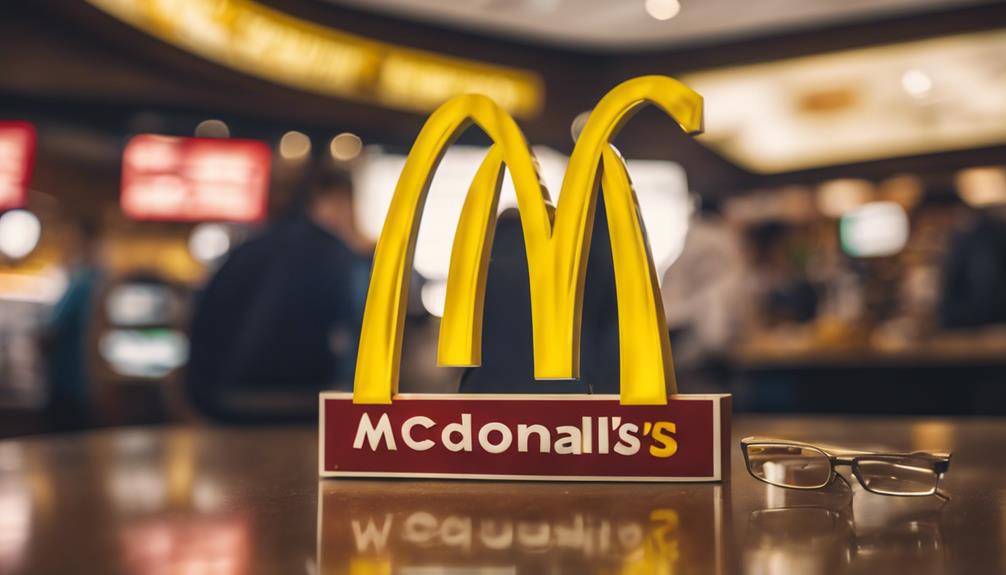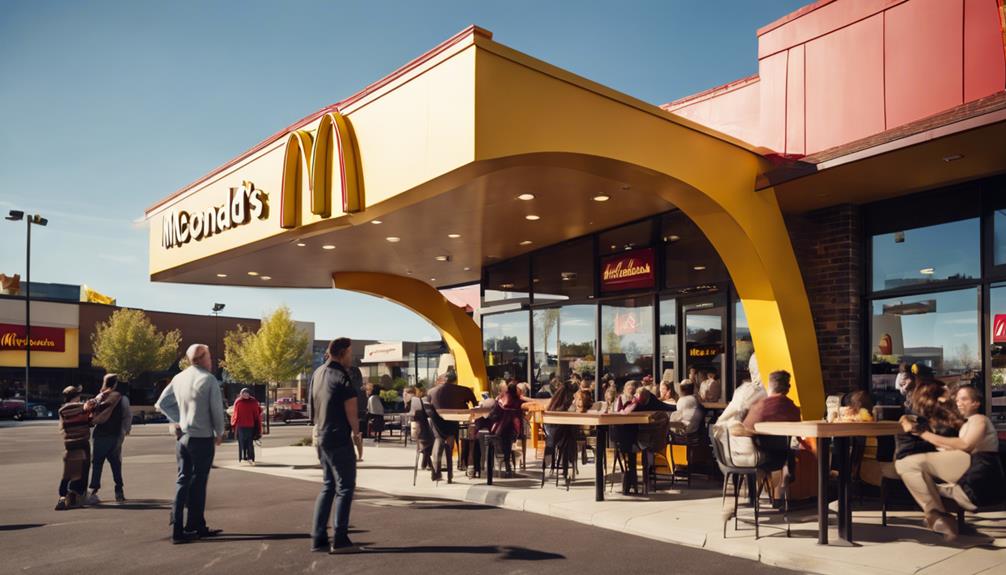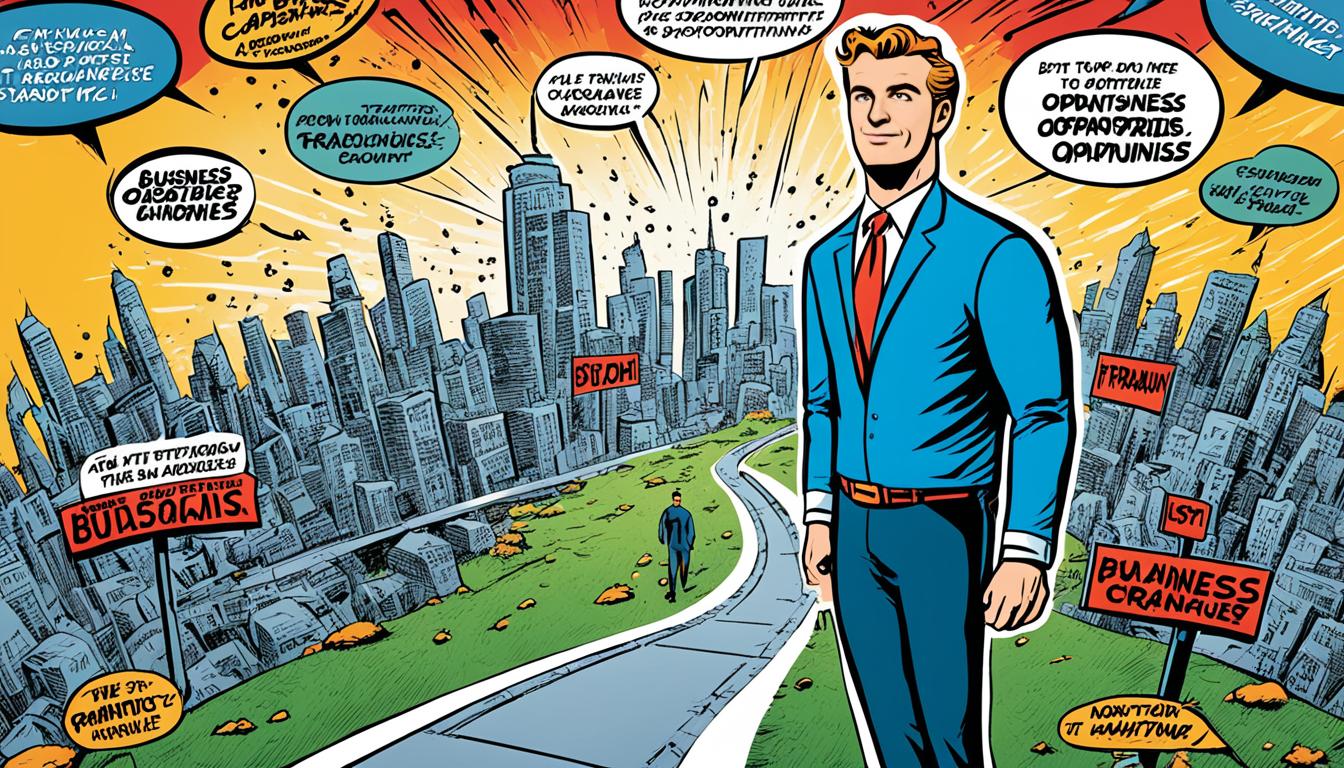Before investing in a McDonald's franchise, potential franchisees should understand its strong market position and franchise model. With initial franchise fees of $45,000 and total investments between $1 million and $2.2 million, financial commitment is significant. Franchisees benefit from extensive training and ongoing support, fostering operational efficiency and customer loyalty. Legal compliance and understanding the franchise agreement are essential for success. Given McDonald's emphasis on innovation, adapting to local markets enhances potential profitability. Insights into demographics and market trends also play an important role. There's more to uncover about the essentials of this investment opportunity.
Key Elements

In understanding the McDonald's franchise, it's crucial to explore its company overview, business model, and the specific information available for potential franchisees.
Each element plays a critical role in shaping the franchisee's journey and success.
Company Overview
McDonald's operates one of the world's most recognized fast-food franchises, boasting a vast network of locations that cater to millions of customers daily. Founded in 1940, it has evolved into a global leader in the quick-service restaurant industry.
The brand is synonymous with convenience and quality, offering a diverse menu that appeals to various tastes. Its iconic golden arches and signature items, like the Big Mac, have become cultural symbols.
McDonald's prioritizes innovation, continuously adapting its menu and services to meet changing consumer demands. The company emphasizes operational efficiency and strong franchise relationships, ensuring that franchisees benefit from its extensive experience and resources in the competitive fast-food landscape.
Business Overview
A successful McDonald's franchise relies on a combination of strategic location selection, thorough training, and robust ongoing support to thrive in the competitive fast-food market.
The franchise model emphasizes the importance of choosing locations that align with specific architectural and landscaping criteria. This careful selection process guarantees ideal visibility and accessibility for customers.
Training is a cornerstone of the franchise, with extensive programs designed to equip franchisees and their staff with essential skills.
Ongoing support enhances operational efficiency, offering resources like marketing assistance, proprietary software, and safety training.
Together, these key elements foster a strong foundation for franchisees, enabling them to navigate the challenges of the fast-food industry and achieve long-term success.
Information for Franchisees
Successful franchisees benefit from understanding key elements that contribute to running a profitable McDonald's operation.
Key aspects include financial commitments, such as a franchise fee of $45,000 and total investments ranging from $1 million to $2.2 million. Franchisees must also possess a minimum of $500,000 in liquid assets.
Training is another essential element, requiring 75 hours of classroom instruction and 6 to 24 months of on-the-job training.
Furthermore, successful franchisees enjoy ongoing support through newsletters, marketing initiatives, and a dedicated support line.
Location selection plays a crucial role; franchisees receive assistance from McDonald's representatives to guarantee alignment with architectural standards and local market readiness, enabling them to establish a thriving business within the franchise network.
Company Overview

Founded in 1955, McDonald's has established itself as a global leader in the fast food industry.
The company's executive team drives innovation and strategic growth, maintaining a strong presence in markets around the world.
With a commanding share of the global market, McDonald's continues to set the standard for franchise opportunities.
Founding Year: 1955
In 1955, McDonald's emerged as a pivotal player in the fast-food industry, setting the stage for its global expansion and franchise opportunities.
Founded by Ray Kroc, the brand revolutionized the way people thought about quick service and convenience. Kroc's vision centered on a consistent, quality experience for customers, which laid the foundation for the franchise model.
By standardizing operations and focusing on efficiency, McDonald's quickly attracted potential franchisees keen to replicate its success.
The brand's commitment to innovation and adaptation has allowed it to remain relevant in an ever-changing market.
Today, McDonald's stands as an indication of Kroc's original vision, boasting a presence in over 100 countries and serving millions daily.
Global Leadership in Fast Food
McDonald's holds a commanding position in the global fast food market, consistently setting standards for quality and efficiency that other franchises aim to emulate.
With a presence in over 100 countries, it serves millions daily, showcasing its ability to adapt to diverse cultures and preferences.
The brand's iconic menu features not only classic items but also localized offerings, appealing to a broad customer base.
McDonald's leverages innovative technology and effective marketing strategies to maintain its competitive edge.
This commitment to excellence is evident in its streamlined operations and robust supply chain management, ensuring consistent product availability and quality.
Such leadership in the fast food industry provides potential franchisees with a strong foundation for success.
Executive Team Overview
The executive team at McDonald's plays a pivotal role in driving the company's strategic vision and maintaining its leadership in the fast food industry.
Composed of experienced professionals from diverse backgrounds, the team leverages their expertise to enhance operational efficiency and foster innovation.
The CEO, partnered with a dedicated group of executives, focuses on adapting to market trends while ensuring brand consistency. They prioritize sustainability efforts and customer engagement, aiming to improve overall dining experiences.
The leadership encourages collaboration across departments, promoting a culture of accountability and performance.
Global Market Share Leadership
Holding a commanding position in the fast food industry, McDonald's boasts significant global market share, driven by its extensive franchise network and brand recognition.
With over 39,000 locations worldwide, the brand remains a leader in quick-service dining, continually expanding its reach in both established and emerging markets.
The company's focus on innovation and adaptability helps it respond to changing consumer preferences, ensuring sustained growth.
McDonald's strategic marketing initiatives and consistent menu offerings contribute to its strong customer loyalty.
As a franchisee, investors benefit from aligning with a brand that not only leads in sales but also benefits from a well-recognized global presence, making it an attractive opportunity for potential investors.
Brand Identity

McDonald's brand identity stands out due to its global presence and commitment to quality service.
This recognition not only elevates customer trust but also gives franchisees a competitive edge in the market.
Global Brand Presence
Establishing a strong global brand presence, McDonald's has become synonymous with fast food, recognized in virtually every corner of the world. Its iconic golden arches and signature menu items create a familiar experience for customers, regardless of location.
This widespread recognition not only attracts loyal patrons but also provides potential franchisees with a competitive edge in the market. The brand's consistent messaging and marketing strategies foster trust and reliability among consumers.
By adapting to local tastes while maintaining core offerings, McDonald's has successfully penetrated diverse markets. This adaptability helps franchisees resonate with their communities, ultimately driving sales and growth.
With strong brand equity, McDonald's continues to thrive in an ever-evolving fast food landscape.
Commitment to Quality Service
A commitment to quality service lies at the heart of McDonald's brand identity, ensuring customers receive a consistent and enjoyable experience. This dedication manifests in various ways, from standardized food preparation processes to rigorous training programs for staff.
McDonald's prioritizes speed and accuracy in service, which fosters customer trust and loyalty. Franchisees are trained to uphold these high standards, emphasizing the importance of service excellence in every interaction.
The brand utilizes customer feedback to continuously improve service quality, adapting to evolving consumer expectations. By focusing on quality service, McDonald's not only strengthens its reputation but also empowers franchisees to build successful businesses, reinforcing the brand's commitment to deliver exceptional experiences across its global locations.
Global Brand Recognition Advantage
Global brand recognition provides franchisees with a significant competitive edge, attracting customers who trust the iconic golden arches.
McDonald's has established itself as a leader in the fast-food industry, thanks to its consistent branding and marketing strategies. This recognition not only draws in loyal customers but also encourages new patrons to try their offerings.
Franchisees benefit from a well-defined brand identity that's associated with quality, convenience, and affordability. The strong global presence allows franchisees to leverage McDonald's reputation, which can lead to higher sales and profitability.
Additionally, the brand's ongoing marketing efforts guarantee that it remains top-of-mind for consumers, further solidifying its advantage in an increasingly competitive marketplace.
Investing in a McDonald's franchise means capitalizing on this powerful brand recognition.
Information for Franchisees

Franchisees benefit from a wealth of resources and support designed to guarantee their success within the McDonald's system. They receive ongoing assistance through newsletters, meetings, and conventions, ensuring they stay informed about best practices.
Access to a toll-free support line and online resources helps franchisees troubleshoot issues promptly. Marketing support is robust, including co-op advertising, templates, and social media initiatives that enhance brand presence.
Additionally, proprietary software and a dedicated franchisee intranet platform streamline operations and communication. Franchisees also undergo thorough training, including security and safety procedure training, which is essential for maintaining operational standards.
This extensive support framework empowers franchisees to thrive in a competitive marketplace while upholding McDonald's esteemed reputation.
Financial Requirements & Ongoing Fees

When considering a McDonald's franchise, potential owners must understand the significant financial commitments involved.
The initial franchise fee is $45,000, with total investments ranging from $1 million to $2.2 million, depending on various factors.
Additionally, franchisees will face ongoing fees, including a percentage of monthly sales and marketing contributions, which are essential for long-term success.
1 Million to $2.2 Million
Investing in a McDonald's franchise requires a substantial initial investment ranging from $1 million to $2.2 million. This amount includes various financial commitments and ongoing fees.
The investment encompasses the franchise fee, equipment, and real estate costs. For new locations, franchisees must meet a down payment requirement of 40%, while existing locations require a 25% down payment.
Additionally, potential franchisees need to have at least $500,000 in non-borrowed liquid assets.
Ongoing fees include a service fee of 4% of monthly sales, along with rent, which varies based on location and lease agreements.
Understanding these financial obligations is vital for anyone considering a McDonald's franchise investment.
45,000 Initial Franchise Investment
Understanding the financial requirements for a McDonald's franchise is critical for potential investors, as it encompasses both the initial investment and ongoing fees necessary for successful operation.
The franchise fee stands at $45,000, while the total initial investment ranges from $1 million to $2.2 million. Investors must also meet specific down payment requirements: 40% for new locations and 25% for existing ones. Additionally, McDonald's mandates a minimum of $500,000 in non-borrowed liquid assets.
Ongoing financial obligations include a service fee of 4% of monthly sales and rent, which varies based on the location. These financial aspects are essential for ensuring the franchise's long-term success and profitability.
% of Monthly Sales
The ongoing financial commitment for a McDonald's franchise includes a service fee that amounts to 4% of monthly sales, alongside variable rent costs based on the location.
Franchisees need to be aware that these ongoing fees can greatly impact profitability. The rent is determined by various factors, including the market and real estate trends in the area.
Since sales can fluctuate based on seasonality and local competition, franchisees must maintain a strong operational strategy to optimize monthly revenues.
Understanding these financial requirements is vital for prospective investors, ensuring they can manage their cash flow effectively while meeting McDonald's standards and expectations.
Marketing Contributions From Sales
Franchisees contribute to marketing efforts through a portion of their sales, ensuring consistent brand visibility and promotional support. This contribution is essential for maintaining McDonald's strong market presence.
Typically, franchisees allocate a percentage of their sales to fund national and regional advertising campaigns. These marketing contributions help drive customer engagement and increase foot traffic, benefiting all franchise locations.
By participating in this marketing system, franchisees leverage McDonald's established brand identity, which is a significant advantage in a competitive marketplace. Additionally, McDonald's provides various marketing tools and resources, facilitating effective advertising efforts.
This collaborative approach fosters a unified brand image, ultimately supporting franchisees' growth and profitability while enhancing the overall customer experience.
Royalties and Operational Expenses
Paying royalties and managing operational expenses are essential financial responsibilities for McDonald's franchise owners, impacting their overall profitability.
Franchisees must pay a service fee of 4% of their monthly sales, alongside rental costs that vary by location. These ongoing fees greatly affect cash flow and should be factored into the franchise's financial planning.
Initial investments range from $1 million to $2.2 million, requiring substantial down payments based on the type of location. Furthermore, maintaining minimum liquid assets of $500,000 guarantees franchisees can cover unforeseen expenses.
Understanding these financial obligations is critical for prospective owners, as they play a fundamental role in achieving long-term success and sustainability in the competitive fast-food market.
Financing Options

When exploring financing options for a McDonald's franchise, potential owners find various flexible solutions at their disposal.
They can consider alternative funding sources and even government-backed loan providers to help meet their financial requirements.
Understanding these options is essential for making informed investment decisions.
Flexible Financing Solutions Available
Numerous financing options are available to help potential franchisees navigate the initial investment costs associated with opening a McDonald's franchise.
Traditional bank loans often serve as a primary choice, providing the necessary capital to cover the franchise fee and initial setup costs.
Additionally, McDonald's offers various financing programs tailored for franchisees, which may include assistance with down payments.
Many franchisees also tap into personal savings or family loans to meet the minimum liquid asset requirements.
The flexibility of these financing solutions enables individuals to find a plan that suits their financial situation, increasing the chances of successfully launching their McDonald's franchise while managing the financial burden effectively.
Alternative Funding Options Available
Exploring alternative funding options can provide potential franchisees with additional avenues to finance their McDonald's investment beyond traditional loans.
Many franchisees consider partnerships, where they can pool resources with others to share the financial burden.
Crowdfunding has also gained popularity, allowing individuals to gather small contributions from a large number of people, making it easier to reach the necessary capital.
Additionally, personal savings or investments from family and friends can supplement traditional funding.
Franchisees might also explore private investors or venture capitalists who are interested in the fast-food industry.
Government-Backed Loan Providers
Government-backed loan providers offer potential franchisees a reliable financing option to help cover the substantial costs associated with investing in a McDonald's franchise.
These loans typically feature lower interest rates and favorable repayment terms, making them an attractive choice for those who qualify.
The U.S. Small Business Administration (SBA) is a primary source, offering various loan programs designed specifically for franchisees.
This can ease the burden of the significant franchise fee and total investment, which can range from $1 million to $2.2 million.
Franchisees should prepare their financial documents and business plans to secure these loans.
With proper planning and guidance, government-backed loans can greatly enhance a franchisee's chances of successfully launching their McDonald's business.
Training & Support Offered

When considering a McDonald's franchise, prospective owners benefit from an extensive 75-hour training course designed to equip them for success.
Continuous skills enhancement sessions guarantee that franchisees stay updated with the latest operational practices.
Additionally, marketing templates and software provide the necessary tools for effective promotional strategies.
Comprehensive 75-Hour Training Course
The extensive 75-hour training course equips franchisees with essential knowledge and skills to successfully operate a McDonald's location. This program combines classroom instruction with practical applications, ensuring participants grasp significant operational processes.
Franchisees learn about food safety, customer service, inventory management, and effective employee training. The structured curriculum allows for an in-depth exploration into McDonald's standards and procedures, setting a solid foundation for success.
In addition to the initial training, on-the-job training ranges from six to twenty-four months, further enhancing their readiness. With this all-encompassing training approach, McDonald's franchisees feel confident in managing their restaurants and delivering the quality experience that customers expect.
This thorough preparation is critical for maneuvering the fast-paced environment of the fast-food industry.
Continuous Skills Enhancement Sessions
Building on the thorough training provided, McDonald's offers continuous skills enhancement sessions that help franchisees stay updated on industry best practices and operational efficiencies.
These sessions are designed to address emerging trends and challenges in the fast-food industry, ensuring franchisees maintain a competitive edge.
With regular workshops and webinars, franchisees can refine their management skills, improve customer service techniques, and learn about the latest operational technologies.
Additionally, McDonald's provides access to resources that allow franchisees to network with peers and share successful strategies.
This commitment to ongoing education demonstrates McDonald's dedication to franchisee success, empowering them to adapt and thrive in a dynamic market, ultimately enhancing the overall customer experience.
Marketing Templates and Software
McDonald's equips franchisees with effective marketing templates and proprietary software to streamline their promotional efforts and enhance customer engagement.
These resources are designed to help franchisees launch targeted campaigns, ensuring consistency with the brand's messaging. The templates cover various marketing channels, including digital, print, and social media, offering a thorough approach to reaching customers.
Additionally, the proprietary software provides valuable analytics, enabling franchisees to track campaign performance and adjust strategies accordingly.
McDonald's also offers ongoing support through its franchisee intranet platform, where franchisees can access updated marketing materials and training resources.
This robust support system empowers franchisees to effectively engage with their communities while driving sales and brand loyalty.
LEGAL AND REGULATORY

When considering a McDonald's franchise, potential investors need to understand the legal and regulatory landscape. This includes reviewing key sections of the franchise agreement and compliance with local health and safety regulations.
Additionally, staying informed about changes in laws affecting the fast-food industry is essential for successful operations.
Key Sections to Review
When considering a McDonald's franchise, it's essential to understand the legal obligations involved.
Franchisees must review key sections of the franchise agreement to guarantee compliance with corporate policies and local regulations.
Ignoring these legal aspects can lead to significant risks and challenges down the road.
Key Sections to Review
A franchisee must thoroughly understand the legal and regulatory requirements governing the operation of a McDonald's franchise to guarantee compliance and success.
This includes reviewing the franchise agreement, understanding labor laws, zoning regulations, and health standards.
Additionally, it's essential to stay informed about any changes in regulations that could impact operations, ensuring a smooth and compliant franchise experience.
Legal Obligations
Understanding the legal obligations for operating a McDonald's franchise is essential for ensuring compliance and long-term success.
Franchisees must review key sections of the franchise agreement, including operational standards, health regulations, and local zoning laws.
Adhering to these requirements not only mitigates legal risks but also fosters a positive relationship with McDonald's, enhancing the overall franchise experience.
MARKET ANALYSIS

The market analysis around McDonald's franchise reveals significant growth in global locations and a strong focus on youth and family segments.
With a notable increase in units over the years, the brand caters to diverse demographics, making it an appealing investment.
Understanding these trends is essential for potential franchisees looking to capitalize on McDonald's enduring popularity.
Global Franchise Growth Statistics
McDonald's is strategically focusing on international expansion, capitalizing on emerging markets.
The growth trajectory in these regions showcases significant opportunities for franchise development.
As McDonald's continues to adapt its model, the potential for increased market penetration remains strong.
International Expansion Focus
International markets have become a significant focus for growth, as McDonald's continues to expand its global footprint with a notable increase in franchise locations.
This strategy reflects the company's commitment to tapping into diverse consumer bases worldwide.
International Market Growth Trajectory
With a strong emphasis on international expansion, McDonald's has seen remarkable growth in franchise locations worldwide, reflecting a robust trajectory in global market penetration.
Over the last decade, international units have surged, particularly in emerging markets.
This strategic focus on diverse regions not only bolsters revenue potential but also positions McDonald's favorably against competitors in the global fast-food landscape.
Youth and Families Segments
McDonald's effectively targets youth and families, making it a go-to destination for meals and gatherings.
With a menu designed to appeal to all ages, the brand fosters a welcoming environment that draws in these key demographics.
Understanding their preferences is essential for franchisees looking to maximize their market potential.
Target Demographics: Families and Youth
Families and youth make up a significant portion of McDonald's customer base, driving demand for the franchise's diverse menu and engaging atmosphere.
This demographic seeks affordability, convenience, and a family-friendly environment.
McDonald's effectively targets families with meal deals and play areas, while youth are attracted to trendy menu items and digital engagement.
Understanding these preferences helps franchisees maximize their market potential.
Target Demographics: Youth and Families
Targeting youth and families, McDonald's caters to their desire for affordable meals and a welcoming atmosphere, fostering repeat visits and brand loyalty.
By offering kid-friendly menu options and play areas, McDonald's creates an inviting space for parents and children.
Additionally, promotional campaigns and value meals attract budget-conscious families, ensuring McDonald's remains a preferred dining choice for these demographics.
EXIT STRATEGY

When considering an exit strategy for a McDonald's franchise, understanding the franchise transfer guidelines is essential.
These guidelines outline the necessary steps and requirements for successfully transferring ownership.
Franchisees can navigate this process smoothly with the right information and support.
Franchise Transfer Guidelines Available
Franchisees looking to shift their McDonald's ownership can access clear transfer guidelines that facilitate a smooth exit strategy. These guidelines outline the necessary steps and requirements for a successful changeover, ensuring all parties understand their roles in the process.
Franchisees must notify McDonald's of their intent to sell and adhere to specific criteria for potential buyers, which often includes financial qualifications and experience in the industry. The franchisor's approval is essential, as it safeguards the brand's integrity.
Franchise Transfer Process Guidelines
Understanding the franchise transfer process is essential for owners planning an exit strategy, as it guarantees a smooth changeover while safeguarding the brand's integrity.
McDonald's requires franchisees to follow specific guidelines when transferring ownership. First, owners must notify the franchisor and submit a transfer request along with the proposed buyer's information.
The prospective owner must meet McDonald's financial and operational standards, including training requirements. A thorough review of the buyer's background and experience ensures they align with McDonald's values.
After approval, the current franchisee and the new owner negotiate the terms of the sale, including pricing and asset transfer.
Completing this process carefully helps maintain the franchise's reputation and operational continuity, benefiting all parties involved.
ADDITIONAL RESOURCES

As potential franchisees consider their investment, it's vital to address common questions that arise during the process.
They can access support contact details and take advantage of networking opportunities to connect with fellow franchisees.
These resources play an important role in ensuring a successful McDonald's franchise experience.
Franchisee Common Questions
Many prospective franchisees have common questions regarding the requirements, support, and potential for success within the McDonald's franchise system.
They often inquire about the initial investment and ongoing fees, as well as the necessary liquid assets.
Questions around the training process, including duration and structure, frequently arise, as franchisees want to guarantee they're adequately prepared.
Additionally, potential franchisees seek clarification on site selection criteria and how local market conditions might impact their success.
They may also wonder about the level of ongoing support from McDonald's, including marketing resources and operational assistance.
Franchisee Support Contact Details
Franchisees can easily access support through a dedicated toll-free contact line and a wealth of online resources provided by McDonald's. This support system guarantees that franchisees have immediate assistance for any operational issues or inquiries.
The online resources include extensive guides, training materials, and updates on company policies, all designed to enhance the franchisee experience. Additionally, franchisees can participate in regular newsletters and meetings, keeping them informed about best practices and company initiatives.
McDonald's also offers proprietary software and tools that streamline operations and improve efficiency. With these resources readily available, franchisees can stay connected, informed, and supported throughout their journey in the McDonald's franchise system.
Franchisee Networking Opportunities
Networking among franchisees is essential for sharing insights, best practices, and fostering collaboration within the McDonald's system.
Franchisees benefit from various networking opportunities, including regional meetings, annual conventions, and online forums. These platforms allow them to connect with fellow franchise owners, exchange ideas, and discuss operational challenges.
Additionally, McDonald's encourages mentorship programs, pairing experienced franchisees with newcomers, enhancing their learning curve. Franchisees can also access a dedicated intranet, which features resources and success stories from peers.
Are the Insights for Investing in a McDonald’s Franchise Applicable to Other Sandwich Franchise Options?
When considering investing in a sandwich franchise, it’s worth noting that the insights for investing in a McDonald’s franchise may not be directly applicable. Each franchise option has its own unique strengths and challenges. However, the demand for irresistible sandwich franchise delights is a common factor across the industry.
Conclusion
To sum up, investing in a McDonald's franchise requires careful consideration of various factors, including financial commitments and training support.
With a significant initial investment and ongoing fees, potential franchisees should thoroughly evaluate their readiness and market opportunities.
McDonald's strong brand identity and extensive resources can provide a solid foundation for success.
By understanding these key insights and leveraging available support, investors can make informed decisions and navigate their franchise journey confidently.









